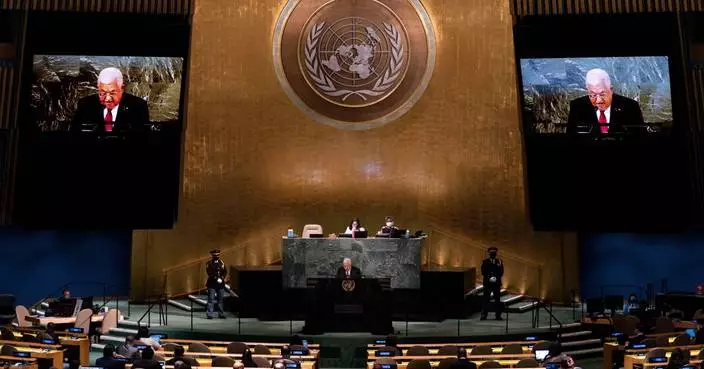Federal immigration agencies have launched a coordinated campaign to arrest and deport immigrants seeking to become legal U.S. residents through marriage, according to documents released this week in a class-action lawsuit filed by the American Civil Liberties Union.
The documents, which include depositions and correspondence from federal officials, show the extent to which officials for the U.S. Citizenship and Immigration Services have been coordinating with their counterparts at Immigration and Customs Enforcement to facilitate arrests at citizenship offices in New England.
The ACLU, in its arguments, criticizes the efforts as a deportation "trap" that violates the constitutional rights of immigrants otherwise following the rules to become legal residents.
"The government created this path for them to seek a green card," Matthew Segal, legal director for the ACLU of Massachusetts, said in an interview Tuesday. "The government can't create that path and then arrest folks for following that path."
An ICE spokesman responded that allegations of "inappropriate coordination" between the two agencies are "unfounded."
"This routine coordination within the Department of Homeland Security, not unlike the cooperative efforts we maintain with many other federal partners, is lawful and legitimate," John Mohan said by email. A spokesman for USCIS said the agency doesn't comment on pending litigation.
The ACLU lawsuit argues that Homeland Security regulations created under former President Barack Obama allow immigrants with U.S.-citizen spouses to stay in the country while they seek a green card — even if they're already subject to deportation.
"That regulation is still the law of the land," Segal said Tuesday. "So arresting these folks is not about law and order. These are people with a path to legalization and the government is trying to block that."
The federal government, in seeking to dismiss the lawsuit, argues in part that federal District Court has no jurisdiction in the matter.
The ACLU's more than 250-page legal brief includes emails between ICE officials outlining how it coordinates arrests with USCIS in New England.
Andrew Graham, a Boston-based ICE officer, said the agency generally receives from USCIS lists of immigrants seeking legal residency who have already been ordered for deportation, had re-entered the country illegally or were considered "an egregious criminal alien."
Graham said ICE then works with USCIS to schedule interviews so that ICE agents can be present to make an arrest. He noted ICE prefers to spread out the interviews to ease the workload on its agents and to prevent generating "negative media interest" from the arrests.
"(A)t the end of the day we are in the removal business and it's our job to locate and arrest them," Graham wrote in part.
The ACLU's legal brief is the latest in the class-action suit filed earlier this year on behalf of immigrants who have been or fear being separated from their U.S.-citizen spouses.
The case will be argued Aug. 20 in Boston federal court and names five couples, including lead plaintiffs Lilian Calderon and Luis Gordillo, of Rhode Island.
Gordillo is a U.S. citizen, but Calderon is a native of Guatemala who came to the country with her family at the age of 3. She was ordered to leave in 2002 after her father was denied asylum.
The 30-year-old mother of two was detained by ICE in January after she and her husband attended an interview at the USCIS office in Johnston, Rhode Island, to confirm their marriage.
Calderon was released in February after the ACLU challenged the detention.
WASHINGTON (AP) — A soon-to-be-released Biden administration review of Israel's use of U.S.-provided weapons in its war in Gaza does not conclude that Israel has violated the terms for their use, according to three people who have been briefed on the matter.
The report is expected to be sharply critical of Israel, even though it doesn't conclude that Israel violated terms of U.S.-Israel weapons agreements, according to one U.S. official.
The administration's findings on its close ally's conduct of the war, a first-of-its-kind assessment that was compelled by President Joe Biden's fellow Democrats in Congress, comes after seven months of airstrikes, ground fighting and aid restrictions that have claimed the lives of nearly 35,000 Palestinians, mostly women and children.
Biden has tried to walk an ever-finer line in his support of Prime Minister Benjamin Netanyahu’s war against Hamas. He has faced growing rancor at home and abroad over the soaring Palestinian death toll and the onset of famine, caused in large part by Israeli restrictions on the movement of food and aid into Gaza. Tensions have been heightened further in recent weeks by Netanyahu’s pledge to expand the Israeli military’s offensive in the crowded southern city of Rafah, despite Biden's adamant opposition.
Biden is in the closing months of a tough reelection campaign against Donald Trump. He faces demands from many Democrats that he cut the flow of offensive weapons to Israel and denunciation from Republicans who accuse him of wavering on support for Israel at its time of need.
Two U.S. officials and a third person briefed on the findings of the national security memorandum to be submitted by Secretary of State Antony Blinken to Congress discussed the findings before the report's release. They spoke on condition of anonymity because the information was not yet public.
A senior Biden administration official said the memorandum is expected to be released later Friday, but declined to comment on its conclusions.
Axios first reported on the memorandum's findings.
The Democratic administration took one of the first steps toward conditioning military aid to Israel in recent days when it paused a shipment of 3,500 bombs out of concern over Israel’s threatened offensive on Rafah, a southern city crowded with more than a million Palestinians, a senior administration official said.
The presidential directive, agreed to in February, obligated the Defense and State departments to conduct “an assessment of any credible reports or allegations that such defense articles and, as appropriate, defense services, have been used in a manner not consistent with international law, including international humanitarian law.”
The agreement also obligated them to tell Congress whether they deemed that Israel has acted to “arbitrarily to deny, restrict, or otherwise impede, directly or indirectly,” delivery of any U.S.-supported humanitarian aid into Gaza for starving civilians there.
Lawmakers and others who advocated for the review said Biden and previous American leaders have followed a double standard when enforcing U.S. laws governing how foreign militaries use U.S. support, an accusation the Biden administration denies. They had urged the administration to make a straightforward legal determination of whether there was credible evidence that specific Israeli airstrikes on schools, crowded neighborhoods, medical workers, aid convoys and other targets, and restrictions on aid shipments into Gaza, violated the laws of war and human rights.
Their opponents argued that a U.S. finding against Israel would weaken it at a time it is battling Hamas and other Iran-backed groups. Any sharply critical findings on Israel are sure to add to pressure on Biden to curb the flow of weapons and money to Israel’s military and further heighten tensions with Netanyahu’s hard-right government over its conduct of the war against Hamas.
Any finding against Israel also could endanger Biden’s support in this year's presidential elections from some voters who keenly support Israel.
At the time the White House agreed to the review, it was working to head off moves from Democratic lawmakers and independent Sen. Bernie Sanders of Vermont to start restricting shipments of weapons to Israel.
Israel launched its offensive after an Oct. 7 assault into Israel, led by Hamas, killed about 1,200 people. Two-thirds of the Palestinians killed since then have been women and children, according to local health officials. U.S. and U.N. officials say Israeli restrictions on food shipments since Oct. 7 have brought on full-fledged famine in northern Gaza.
Human rights groups long have accused Israeli security forces of committing abuses against Palestinians and have accused Israeli leaders of failing to hold those responsible to account. In January, in a case brought by South Africa, the top U.N. court ordered Israel to do all it could to prevent death, destruction and any acts of genocide in Gaza, but the panel stopped short of ordering an end to the military offensive.
Israel says it is following all U.S. and international law, that it investigates allegations of abuse by its security forces and that its campaign in Gaza is proportional to the existential threat it says is posed by Hamas.
Biden in December said “indiscriminate bombing” was costing Israel international backing. After Israeli forces targeted and killed seven aid workers from the World Central Kitchen in April, the Biden administration for the first time signaled it might cut military aid to Israel if it didn’t change its handling of the war and humanitarian aid.
Presidents Ronald Reagan and George H.W. Bush, in the 1980s and early 1990s, were the last presidents to openly hold back weapons or military financing to try to push Israel to change its actions in the region or toward Palestinians.
A report to the Biden administration by an unofficial, self-formed panel including military experts, academics and former State Department officials detailed Israeli strikes on aid convoys, journalists, hospitals, schools and refugee centers and other sites. They argued that the civilian death toll in those strikes — such as an Oct. 31 strike on an apartment building reported to have killed 106 civilians — was disproportionate to the blow against any military target.

Palestinians mourn their relatives killed in the Israeli bombardment of the Gaza Strip, at a hospital in Rafah, Gaza, Friday, May 10, 2024. (AP Photo/Ismael Abu Dayyah)

U.S. President Joe Biden boards Marine One at Moffett Airfield in Mountain View, Calif., Thursday, May 9, 2024. (Jose Carlos Fajardo/Pool Photo via AP)











